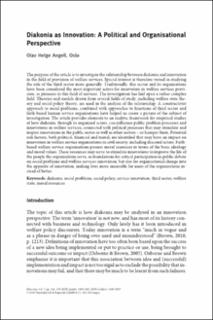| dc.contributor.author | Angell, Olav Helge | |
| dc.date.accessioned | 2024-04-05T09:31:01Z | |
| dc.date.available | 2024-04-05T09:31:01Z | |
| dc.date.created | 2017-01-31T18:54:38Z | |
| dc.date.issued | 2016 | |
| dc.identifier.citation | Diaconia. Journal for the Study of Christian Social Practice. 2016, 7 (2), 142-158. | en_US |
| dc.identifier.issn | 1869-3261 | |
| dc.identifier.uri | https://hdl.handle.net/11250/3125029 | |
| dc.description.abstract | The purpose of the article is to investigate the relationship between diakonia and innovationin the field of provision of welfare services. Special interest is therefore vested in studyingthe role of the third sector more generally. Traditionally, this sector and its organisationshave been considered the most important actors for innovation in welfare services provi-sion, as pioneers in this field of services. The investigation has laid open a rather complexfield. Theories and models drawn from several fields of study, including welfare state the-ory and social policy theory, are used in the analysis of the relationship. A constructivistapproach to social problems, combined with approaches to functions of third sector andfaith-based human service organisations have helped us create a picture of the subject ofinvestigation. The article provides elements to an analytic framework for empirical studiesof how diakonia, through its organised actors, can influence public problem processes andinnovations in welfare services, connected with political processes that may stimulate andinspire innovations in the public sector as well as other sectors – or hamper them. Potentialrisk factors, both political, financial and moral, are identified that may have an impact oninnovation in welfare service organisations in civil society, including diaconal actors. Faith-based welfare service organisations possess moral resources in terms of the basic ideologyand moral values. These resources may serve to stimulate innovations to improve the life ofthe people the organisations serve, as foundations for critical participation in public debateon social problems and welfare services innovation, but also for organisational change intothe opposite of innovation, making lives more miserable for users of the organisations in-stead of better. | en_US |
| dc.language.iso | eng | en_US |
| dc.publisher | Vandenhoeck & Ruprecht | en_US |
| dc.rights | Attribution-NonCommercial-NoDerivatives 4.0 Internasjonal | * |
| dc.rights.uri | http://creativecommons.org/licenses/by-nc-nd/4.0/deed.no | * |
| dc.subject | moral resources | en_US |
| dc.subject | welfarestate | en_US |
| dc.subject | third sector | en_US |
| dc.subject | service innovation | en_US |
| dc.subject | social policy | en_US |
| dc.subject | social problems | en_US |
| dc.subject | diakonia | en_US |
| dc.title | Diakonia as innovation: A political and organisational perspective | en_US |
| dc.type | Peer reviewed | en_US |
| dc.type | Journal article | en_US |
| dc.description.version | publishedVersion | en_US |
| dc.rights.holder | © 2016 Vandenhoeck & Ruprecht GmbH & Co. KG, Göttingen | en_US |
| dc.source.pagenumber | 142-158 | en_US |
| dc.source.volume | 7 | en_US |
| dc.source.journal | Diaconia. Journal for the Study of Christian Social Practice | en_US |
| dc.source.issue | 2 | en_US |
| dc.identifier.doi | 10.13109/diac.2016.7.2.142 | |
| dc.identifier.cristin | 1444273 | |
| cristin.ispublished | true | |
| cristin.fulltext | original | |
| cristin.qualitycode | 1 | |

